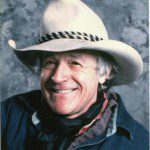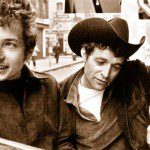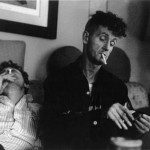Ramblin’ Jack Elliott: Carrying on the Music of Woody Guthrie at the Kennedy Center, Oct. 14
By • October 15, 2012 0 2740

Come Sunday evening, Oct. 14 at 7:30 p.m. in the Kennedy Center’s Concert Hall, it looks like it is going to get crowded on that stage when all the performers get together to honor America’s troubadour of the working man and Dust Bowl poet. “This Land is Your Land—The Woody Guthrie Centennial Celebration Concert” is a tribute to the Oklahoma singer-songwriter, born in 1912.
It’s also probably fair to say that there is likely no performer on that stage—and it’s scheduled to include, among others, Ry Cooder, Judy Collins, Donovan, Jimmy LaFave, John Mellencamp and the Old Crow Medicine Show—who is more directly and closely connected to the spirit of Guthrie’s music and song book and to the man himself than a guy named Ramblin’ Jack Elliott. (Elliott is also appearing in a special Guthrie centennial concert at 8 p.m. and is part of a discussion and celebration with LeFave and Noel Paul Stookey of Peter, Paul and Mary at beginning at 1 p.m. at the Library of Congress on Saturday, Oct. 13.)
The salutes include Guthrie’s son Arlo himself (who’s also scheduled to perform), who had acknowledged that he learned a lot about his father’s music mostly from Elliott, who’s described as Guthrie’s protégé by folk music chroniclers.
Elliott is 81 now, still touring a lot, still holding the Guthrie legacy up high, still singing, still wearing cowboy hats and boots, still scattering stories around like candy “I think my agent’s trying to kill me,” he said in a phone interview while he was staying with friends in an old East Coast stomping ground. “He’s scheduling me all over the place.” He’s not riding as a hobo on freight trains like Guthrie did. Elliott is flying a lot, however, which he doesn’t appreciate because it involved going through airports. “I don’t like airports,” he said. “They make me nervous. I like the window seat because I can look out and see what we’re flying over, and that makes me calm.”
“He’s out buying boots,” they told me when I first called. “Say, did you ever hear how Jack got his name?” I allowed that I hadn’t so I was told the oft-told tale of how Elliott once visited the famed folk singer Odetta at her home. Her mom said she was taking a bath and would he like to sit and chat with her on the porch while they waited. So, they did. After a considerable time, Odetta’s mom said in amazement, “Well, that Jack, he sure likes to ramble.”
He did, and he still does. I can vouch for that. A conversation with Jack Elliott is a bumpy ride, but not unpleasant, with many detours. It’s like a ride in an as-yet-uninvented but often imagined time machine, one of those modes of transportation that he’s so enamored with. “I used to be a truck driver and when I see a red light, I stop,” he often tells people.
A small confession is in order here: I used to hear Elliott sing—stuff like “If I Were a Carpenter” and “San Francisco Bay Blues” that I remember clearly—in Marin County in the San Francisco Bay area in a place called the Lion’s Share, run by the son of a well-known national conservative columnist. In the late 1960s around there, you could run into legendary musicians and legends to be legends who were every five minutes if you tried. They gathered regularly at the Lion’s Share, some of them, the folkies like Dave Von Ronck, Mississippi Blues stalwarts like the Reverend Blind Gary Davis and locals living in Marin. Of course, the locals there were Jerry Garcia, Grace Slick, Steve Miller or Van Morrison and Janis Joplin’s band Big Brother and the Holding Company.
“I remember that place, Mike Considine and the bartender, Zane, Zane Plemmons,” he recalled. “He was a fighter pilot in Viet Nam. The place burned down in 1969, and they moved to San Anselmo.”
All of that true, and much more. It was one of the pit stops. But I remember even then he had that thin, laconic cowboy look when he was singing and walking around. You’d never have guessed that he was born and raised a nice Jewish boy in Brooklyn. “Then, I ran away with the rodeo,” he said. Literally, for a few weeks at least, long enough to get him into the cowboy music and cowboy mode, courtesy of a rodeo clown who sang.
When he took music seriously—always traveling, sometimes trucking, sometimes by plane—he had learned to fly a P41 Mustang, somehow. While going to Adelphi University in Long Island, he had heard a lot about Guthrie and was learning his music and knew a guitar player who knew Guthrie and sometimes went to Guthrie’s home in Coney Island to jam with other musicians. “About this time, he landed in the hospital (Guthrie had Parkinson’s to which he succumbed in 1967), and I met him there,” Elliott said. “He had skin gold brown from his time as a hobo riding the rails. He and his family, they kind of took me in for a time. Then, I traveled out west with him, and I sang with him sometimes.”
Elliott also picked up on trucking, sailing, cars, planes, the trains, planes and automobiles—things about which he writes and sings, and surely talks. It is the imagery of night roads and trucks, as water and flying sort of drift into his conversation and stories, and as he said, “Yeah, I got an interest in that stuff, sure.”
“Woody, he was the great American troubadour, the song man,” Elliott said. He was for the common man, the working man. He was a labor guy, the hobo and the hungry children, and he didn’t much like big business. He was a union guy, I guess. But you know what I think? I know some people wouldn’t agree with you on that: he was a great American to me and a great American patriot. He was about the American spirit. He embodied it.”
“He wasn’t necessarily an easy man, but you could love that man,” he said. “ He wrote hundreds and hundreds of songs, all kinds of songs, and he wrote about construction work, and the road, the railroads and he had a song about building a dam, the Columbia River. ”
Over the phone, he started singing to the tune of “Wabash Cannonball,” and the voice was as strong as I remembered it, rich and moving like a train whistle. “I wrote a lot of songs, but I didn’t write ‘If I Were a Carpenter,’ but I sang it a lot—and so did a lot of other people. Tim Hardin wrote it, he was a brilliant guy, but a tough guy. Don’t want to tell you how he felt about the Bobby Darin version.”
If he was Guthrie’s successor, protégé, why then Elliott had a similar effect on Bob Dylan, who was also smitten with the legend and songs of Woody Guthrie and influenced by Elliott. They would kid around—Dylan inviting Elliott on his Rollling Thunder Tour, Elliott kiddingly talking about “my son Bob Dylan.”
Dylan—who started out doing talking blues—became a major genius-grade superstar, while Guthrie’s name is now iconic and historic. They even celebrated his centennial in Oklahoma along with Austria. Elliott is the living legend flying under the radar, making music and albums.
“Talking blues, man, that was around a long time,” he said, and then started telling me about a man he met in Petaluma, Calif. “ He had really interesting seafaring tattoos. So, you meet a guy like that, talking about shore leave all over the world, talking about the ships and stuff, and we’re in Petaluma.”
I wish I’d recorded that and just about everything Elliott said. He carries Guthrie’s stuff around with him—like dust that never washes off. He travels a lot, he sings strong and clear and he has a cartful of memories he draws on. “Janis,” he recalled. “Well, I spent a week with her one afternoon. She was going to be doing the “Pearl” album I think, but here we all were, Kris [Krisofferson, who had written “Me and Bobbie McGee”] on one side of her and me on the other, and she started singing the song “…busted flat in Baton Rouge, waiting for a train…”
Right there, you could see it and hear it. You could hear train whistles in the stories, you could see the gaunt face of Woodie Guthrie. On Elliott’s website, there’s a recording of Elliott, Sonny McGee and Guthrie singing about “Railroad Bill.” Woody is singing clearly and then says, “Take it, Jack.” And Jack picked up.
Come Sunday, they’ll be singing, not “Bye, bye, Miss American Pie” but “This Land is Your Land”—which I heard a few thousand people sing at a Ukelele festival on the lawns of Strathmore last year. It could stand some singing now.
One stanza goes like this: “I’ve roamed and rambled and I followed my footsteps/To the sparkling sands of her diamond deserts/and all around me a voice was sounding: This Land was made for you and me.”
Take it, Jack.
- Ramblin’ Jack Elliott




